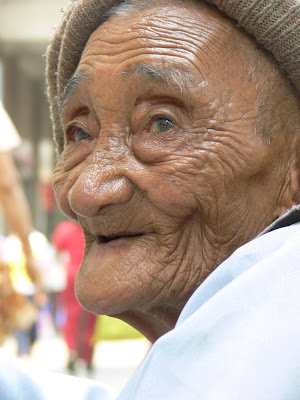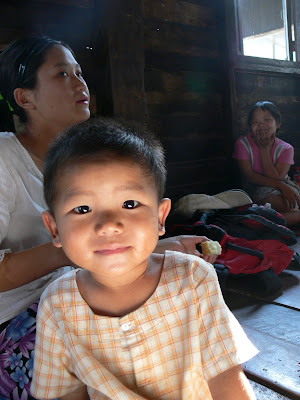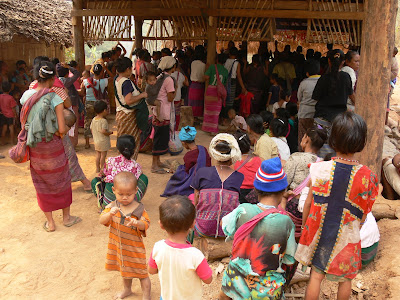 Now out of Burma and in an international airport, sorting through memories like a photo album. Luckily I had a camera and voice recorder to help.
Now out of Burma and in an international airport, sorting through memories like a photo album. Luckily I had a camera and voice recorder to help.Just this morning I was in the Delta, the area hardest hit by the Nargis Typhoon two years ago. It was also the area totally off limits to foreigners. Some NGO's have gotten permission to get in, and when I was given the opportunity, I jumped at it. The reason it is closed has nothing to do with security. Simply, it exposes the government for their ineptitude to help their own people. It is out of sight (you can only get around by boat), and therefore out of mind. That was until Nargis hit in 2008, drowning thousands, followed by thousands more deaths when the Burmese government refused to allow relief organizations in.
 Its funny how your thinking changes based on comparison. When I first arrived in Thailand from America I thought it was struggling. Then I meet the Karen and see a people that truly are in desperate need. Then to Burma where the safety net disappeared and the people lived in a strange mix of dictatorship, socialist propaganda, democratic desires, and pragmatic anarchy. Like an Asian Cuba minus the organized government. And then today I saw those living in the Delta. I think what got me most was simply the remoteness. Say you want to call someone who lives down one of the countless river offshoots. You would call a shop that is at the mouth of the river, and leave a message that you called for so-and-so. When someone comes by that is headed in your direction the store owner passes on that you had a call (could be days before), and they shout out the message to you as they paddle past your village. You then either go upriver or wait for someone who takes you to the phone and then (provided electricity is working and the phones arent down and the other person picks up) you make your connection. That is exactly what had to happen to get me in, multiple times. To call it a privilege is no exaggeration. People literally took me in, and they thought I was doing them a favor.
Its funny how your thinking changes based on comparison. When I first arrived in Thailand from America I thought it was struggling. Then I meet the Karen and see a people that truly are in desperate need. Then to Burma where the safety net disappeared and the people lived in a strange mix of dictatorship, socialist propaganda, democratic desires, and pragmatic anarchy. Like an Asian Cuba minus the organized government. And then today I saw those living in the Delta. I think what got me most was simply the remoteness. Say you want to call someone who lives down one of the countless river offshoots. You would call a shop that is at the mouth of the river, and leave a message that you called for so-and-so. When someone comes by that is headed in your direction the store owner passes on that you had a call (could be days before), and they shout out the message to you as they paddle past your village. You then either go upriver or wait for someone who takes you to the phone and then (provided electricity is working and the phones arent down and the other person picks up) you make your connection. That is exactly what had to happen to get me in, multiple times. To call it a privilege is no exaggeration. People literally took me in, and they thought I was doing them a favor.The Christians there are under special persecution from the Buddhist monks. Local government leade rs have relative autonomy and as long as what the Christians bring is good for their village, its ok. However, the Buddhists see it as a zero-sum game. Any influence they lose means less power, and in its most concrete form, less donations and food for the temple/monastery. So when Christians go in, they have to do so very gently, letting their community aid be their reference. This means preschools, food (pigs, ducks), rebuilding bamboo houses from Nargis, and small house groups at night. To the left is a kids section in the newspaper--The Tatmadaw is the military. The greedy guy in the tophat is a westerner (me).
rs have relative autonomy and as long as what the Christians bring is good for their village, its ok. However, the Buddhists see it as a zero-sum game. Any influence they lose means less power, and in its most concrete form, less donations and food for the temple/monastery. So when Christians go in, they have to do so very gently, letting their community aid be their reference. This means preschools, food (pigs, ducks), rebuilding bamboo houses from Nargis, and small house groups at night. To the left is a kids section in the newspaper--The Tatmadaw is the military. The greedy guy in the tophat is a westerner (me).
 rs have relative autonomy and as long as what the Christians bring is good for their village, its ok. However, the Buddhists see it as a zero-sum game. Any influence they lose means less power, and in its most concrete form, less donations and food for the temple/monastery. So when Christians go in, they have to do so very gently, letting their community aid be their reference. This means preschools, food (pigs, ducks), rebuilding bamboo houses from Nargis, and small house groups at night. To the left is a kids section in the newspaper--The Tatmadaw is the military. The greedy guy in the tophat is a westerner (me).
rs have relative autonomy and as long as what the Christians bring is good for their village, its ok. However, the Buddhists see it as a zero-sum game. Any influence they lose means less power, and in its most concrete form, less donations and food for the temple/monastery. So when Christians go in, they have to do so very gently, letting their community aid be their reference. This means preschools, food (pigs, ducks), rebuilding bamboo houses from Nargis, and small house groups at night. To the left is a kids section in the newspaper--The Tatmadaw is the military. The greedy guy in the tophat is a westerner (me).I started off by saying Burma is a land of contradictions. On the surface this is easy to see: the dollar is outlawed yet there are stores that are only allowed to use the dollar. The internet firewall stops you from accessing Gmail or Yahoo, but there are large permanent signs advertising the internet cafes that have hacking software that will access online email. The contradictions go deeper. A country that is supposedly based on Buddhism cracked down on monks after the recent protest. 50% of its GDP is spent on military, and only 2% on healthcare and education, yet the official name of the government is the State Peace and Development Council. However, the contradictions were personal for me as well. Coming from seeing the Karen people who have suffered so much at the hands of the Burma Army I expected the capitol of Burma (Yangon) to be something like Berlin in 1939. However, I was surprised. The people are... well, people. They are all the mix of emotions that any of us are. And the government is largely absent unless they are collecting money or enforcing some random law. I traveled to areas that I was supposedly not allowed in, and the whole way just a small fee and a smile got me by the roadblocks. There is a huge disconnect between those in power making the rules and those actually enforcing those rules. If contradiction isnt the right word, maybe "isolated" is. Those in power seem to have a perception that doesnt match reality; through that crack light shines through.









 I headed to a town, sat on the edge of a river and sorted through my thoughts as the sun went down. Ill post some more pics here of the orphans...
I headed to a town, sat on the edge of a river and sorted through my thoughts as the sun went down. Ill post some more pics here of the orphans... 


















